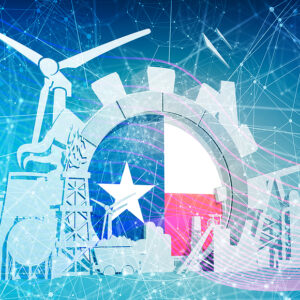Editor’s Note: For another viewpoint, see Point: Texas Blizzard Is a Preview of Biden’s Blackout Agenda.
It was Valentine’s Day when the snow really began. It’s rare we get snow like this, so my partner and I bundled up and celebrated the holiday walking through the quiet, freshly snow-covered streets. As we walked, the snow continued to fall, and by night nearly 6 inches accumulated across the neighborhood.
The first blackout hit my community early the next morning. After that, we were largely without power, heat and water for days. The rare, short moments we had electricity were used to charge our cell phones so that we could check in on friends and family who are more vulnerable to the cold than us. I didn’t think the energy grid was going to fail. I didn’t think the energy grid could fail. And yet, we sat in freezing temperatures, beneath layers of blankets, hoping a space heater would keep our poorly insulated home warm through the night.
I was born and raised in Texas. I’ve seen how our increasingly strained climate is affecting our communities, which is why I’ve spent the majority of my career trying to stop the buildout of power plants that spew dangerous pollution into our neighborhoods. I’ve sat in countless hearings listening to the fossil fuel industry tell decision-makers and community members that we need fossil fuel infrastructure to keep the lights on. So billions of dollars was spent on the system that failed us.
Our energy grid is largely powered by coal and gas power plants, and it was the gas generators and gas supply that failed massively. Even though Texas is home to the largest oil and gas fields in the nation, the cold weather made it nearly impossible for many gas plants to get fuel and continue operating. Our power failure was also due to a massive lack of preparation, and I worry the community will be stuck paying for the damage of our ill-prepared governor and utilities as COVID continues to strain our local economy.
Now that the lights have turned back on and we’ve checked in on our loved ones, we need to take a real look at how we want to build a resilient electricity system. Building more of the same will not fix this problem. It will only make it worse. Gas and coal power plants in Texas already contribute more than 210 million metric tons of climate-altering pollution every year. Adding more fossil fuel power will strain an already fragile climate. That means, we need to take a critical look at whether or not the 25 large proposed gas plants for Texas are a prudent investment or a massive risk.
What’s happened to me and my neighbors has and could happen to other communities around the country. In California, millions of households went dark because the gas plants weren’t able to deliver enough energy to power the air conditioners needed to stay cool during heat waves, and strained power grids caused outages in Louisiana, Oregon, Kentucky, West Virginia, Virginia, Ohio and Mississippi during the most recent winter storms.
What we need in Texas and across the country is greater investment in a reliable grid — one that’s power source doesn’t exacerbate the climate crisis. Texas has some of the best wind resources in the United States. Still, many turbines weren’t weatherized to perform well in cold weather, a standard practice in colder climates like Michigan, Wisconsin and Minnesota.
We should invest in making Texas’ wind resources more resilient and prepared for the extreme weather we now face. And in this Texas circumstance, bigger is not always better. We also need to invest in community-based energy systems, like rooftop and community solar, so neighborhoods can rely on the sun for power. We need to make homes more resilient to this weather and more energy efficient. That means better energy efficiency standards for utilities and installing better installation, windows and doors.
There is so much to learn from all of this and we deserve answers. I, along with my elderly neighbors, sat in our homes … scared, cold, frustrated and confused. We had been told that all of this fossil fuel infrastructure would keep the lights on, and it didn’t. We deserve better. Communities across the country deserve better. After all, we foot the bill for this infrastructure, and it’s about time that our money is spent on preparing us for an increasingly volatile climate.
Now that the worst is presumed over, we must do everything we can to make sure it doesn’t happen again. After spending those days bundled up and walking into the snow to huddle with my neighbors around a fire, sipping tea and waiting for the lights to come on, I’ve realized that anger should not be my main takeaway from this; rather, an urgent need for action and accountability should be.
And down here in Texas, I’m not alone.

